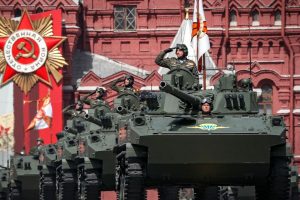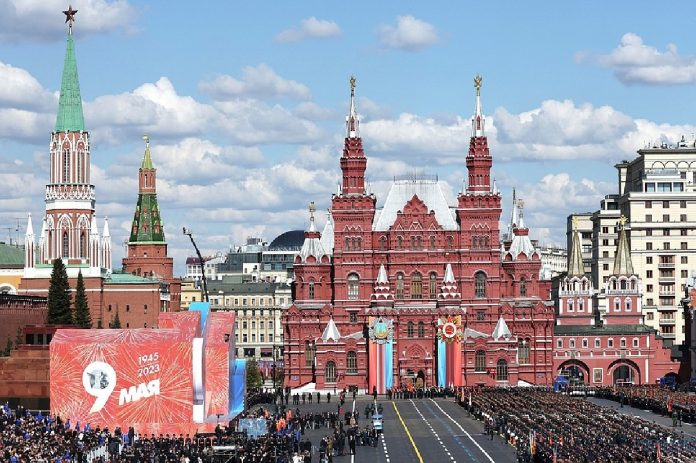On May 9 this year, 79th anniversary of Russia’s Victory Day, which is known for victory over Nazi Germany in World War Two shall be celebrated throughout the world. For Russians, May 9, Thursday marks the 79th anniversary of victory over Nazi Germany in World War Two. The Soviet Union – then including not only Russia but also Ukraine, Belarus and others – lost 27 million people in what Russians call the Great Patriotic War, more than any other country.
Nazi Germany’s unconditional surrender came into force at 11:01 p.m. on May 8, 1945, marked as Victory in Europe Day by France, Britain and the United States. In Moscow it was already May 9, which became the Soviet Union’s Victory Day.
In the chronicles of history, certain dates stand out as symbols of resilience, sacrifice, and victory. May 9th is one such date for Russia, a day that commemorates the unparalleled sacrifices made during World War II and the eventual triumph over the forces of fascism. Known as Victory Day, it is a solemn yet celebratory occasion that holds profound significance for Russians and echoes throughout the world.
Victory Day marks the capitulation of Nazi Germany to the Soviet Union in 1945, effectively ending one of the deadliest conflicts in human history. The Great Patriotic War, as it is known in Russia, exacted an immense toll on the nation, claiming the lives of over 20 million Soviet citizens and leaving indelible scars on the landscape and psyche of the country.
The Battle of Stalingrad, the Siege of Leningrad, and the defense of Moscow are just a few chapters in the epic saga of Soviet resistance against Nazi aggression. The relentless determination of the Soviet people, coupled with strategic brilliance and unmatched bravery, turned the tide of the war and set the stage for the eventual defeat of Hitler’s regime.

Victory Day is not merely a commemoration of historical events but a testament to the enduring spirit of the Russian people. It symbolizes unity, resilience, and the triumph of good over evil. The Victory Banner, raised atop the Reichstag in Berlin, serves as a powerful emblem of victory and liberation, a symbol of hope amidst the darkness of war.
For many Russians, Victory Day is deeply personal, evoking memories of loved ones lost, hardships endured, and the resilience of the human spirit. It is a day of remembrance, honoring the sacrifices of those who gave their lives for the freedom of future generations.
The observance of Victory Day is marked by a series of solemn ceremonies and vibrant celebrations across Russia and other countries of the former Soviet Union. The day typically begins with a military parade in Moscow’s Red Square, featuring precision drills, martial music, and a display of military hardware, including tanks, aircraft, and missiles.
Following the parade, solemn wreath-laying ceremonies take place at war memorials and cemeteries, where veterans, dignitaries, and ordinary citizens pay their respects to the fallen. Immortal Regiment marches, where participants carry portraits of their ancestors who fought in the war, serve as poignant reminders of the human cost of victory.
In the evening, the sky erupts in a blaze of fireworks as people gather to celebrate the hard-won triumph of their nation. Concerts, street performances, and communal gatherings foster a sense of camaraderie and solidarity, uniting people across generations in a shared reverence for the past.
As time marches on and the ranks of World War II veterans dwindle, the importance of preserving the memory of their sacrifices becomes ever more paramount. Victory Day serves as a solemn reminder of the horrors of war and the price of freedom, urging future generations to cherish peace and strive for a world free from conflict.
Moreover, Victory Day transcends national boundaries, serving as a universal symbol of resistance against tyranny and oppression. It reminds us of the collective responsibility to safeguard the principles of justice, equality, and human dignity for generations to come.
Victory Day is not merely a date on the calendar but a living testament to the resilience of the human spirit and the triumph of hope over despair. It is a day to honor the past, celebrate the present, and reaffirm our commitment to a future of peace, prosperity, and mutual understanding. As we commemorate the sacrifices of the past, let us draw inspiration from the courage and fortitude of those who came before us, ensuring that their legacy lives on in the hearts and minds of generations yet unborn.
Last year, during the 78th anniversary of Victory Day, Russian President Vladimir Putin linked the historical victory to contemporary geopolitics, drawing parallels between World War II and the ongoing conflict in Ukraine. Putin lamented what he deemed as Western interference, accusing globalist elites of perpetuating conflicts and undermining traditional values. He asserted that Russia’s actions in Ukraine were necessary to safeguard its security against perceived threats orchestrated by Ukraine with support from the US and its allies.
Addressing troops at the military parade on Red Square, Putin underscored the significance of their mission in Ukraine, portraying it as a defense of the motherland and a continuation of the legacy of World War II. He paid homage to fallen soldiers and emphasized the importance of remembering the lessons of history to prevent the resurgence of fascism and aggression.
From a podium on Moscow’s Red Square, the Russian leader drew a long comparison between the war of 1941-1945 and “the catastrophe that is unfolding at the moment in Ukraine”. President Putin attributed this catastrophe to Western globalist elites”, who were the object of a violent diatribe: “The West creates conflicts and coups, maintains a cult of Nazism and destroys traditional values to keep dictating its will to the people and perpetuating a system of theft and violence”.
Speaking at a military parade on Red Square marking the World War II victory over the Nazis, President Putin drew parallels between the Red Army’s fighting against the Nazi troops and Russia’s actions in Ukraine.
Addressing the phalanxes of Russian troops filling Red Square, President Putin said the campaign in Ukraine was a necessary move to avert what he described as a threat that was absolutely unacceptable to us [that] has been methodically created next to our borders.
“The danger was rising by the day”, he said, adding that “Russia has given a pre-emptive response to an aggression” in what he described as a “forced, timely and the only correct decision by a sovereign, powerful and independent country”.
The Russian leader accused Ukraine of harboring aggressive intentions, with support from the US and its allies.
The Russian leader emphasized the Russian troops were fighting for the country’s security in Ukraine and called a minute of silence to honor the soldiers who fell in combat.
President Vladimir Putin noted some of the troops taking part in the parade have fought in Ukraine.
He said the troops in Ukraine have been “fighting for the Motherland, so that no-one will forget the lessons of World War II and there will be no place in the world for hangmen, executioners and the Nazis”.
Beyond the borders of Russia, Victory Day was commemorated with reverence and solidarity. In Bangladesh, a grand event organized by the Association of Russian Compatriots in Bangladesh Rodina and the Russian House in Dhaka marked the 78th anniversary of Victory Day. ambassador extraordinary and plenipotentiary of the Russian Federation to the People’s Republic of Bangladesh highlighted the importance of honoring the Soviet Union’s pivotal role in defeating Nazism, drawing together attendees from various backgrounds, including alumni associations, chambers of commerce, students, and embassy staff.
As the world remembers the sacrifices of the past, these commemorations serve as poignant reminders of the enduring legacy of courage, resilience, and unity in the face of adversity. They reaffirm the commitment to preserving peace, upholding shared values, and ensuring that the lessons of history guide us towards a future free from tyranny and conflict.
Significance of May 9 Victory Day
Victory Day, observed on May 9th, holds immense importance for the Russian Federation due to several key reasons deeply ingrained in the nation’s history, culture, and collective memory:
- Historical significance: Victory Day commemorates the Soviet Union’s victory over Nazi Germany in World War II, a pivotal moment in history that shaped the course of the 20th century. The war exacted an unprecedented toll on the Soviet Union, with over 27 million lives lost and immense devastation inflicted on its territories. Victory Day thus represents the triumph of the Soviet people’s resilience, sacrifice, and determination in the face of overwhelming adversity.
- National unity and identity: For Russians, Victory Day is a unifying force that transcends political divides and unites the nation in remembrance and celebration. It reinforces a sense of national identity rooted in shared history and collective memory, fostering solidarity among citizens across diverse backgrounds and generations. The sacrifices made during World War II are seen as a testament to the strength and endurance of the Russian people, forging a deep sense of pride and patriotism.
- Honoring veterans and fallen heroes: Victory Day provides an opportunity to pay tribute to the veterans who fought bravely on the front lines and to remember the millions of soldiers and civilians who perished during the war. The memory of their sacrifices is honored through solemn ceremonies, wreath-laying rituals, and commemorative events held across the country. These acts of remembrance ensure that the legacy of courage and valor lives on, inspiring future generations to cherish freedom and peace.
- Resilience against adversity: The observance of Victory Day serves as a reminder of Russia’s resilience in the face of adversity and its ability to overcome seemingly insurmountable challenges. The victory in World War II, achieved through sheer determination and sacrifice, instills a sense of confidence and fortitude in confronting contemporary challenges and threats to national security and sovereignty.
- International significance: Victory Day holds significance beyond Russia’s borders, symbolizing the collective victory of the Allied powers over fascism and tyranny. It serves as a reminder of the importance of international cooperation, solidarity, and the preservation of peace. Through diplomatic outreach and commemorative events, Russia seeks to promote global awareness of the lessons of World War II and the imperative of preventing future conflicts.
Victory Day represents more than just a historical milestone; it is a deeply meaningful and enduring symbol of Russia’s resilience, unity, and commitment to honoring the memory of those who sacrificed for the cause of freedom and justice. It reaffirms Russia’s place in the global community and its dedication to upholding the values of peace, solidarity, and remembrance.
С Днём Победы! Поздравляю вас с 79-й годовщиной Великой Победы! Пусть память о подвиге наших предков всегда будет с нами, и да пребудет мир на земле!




